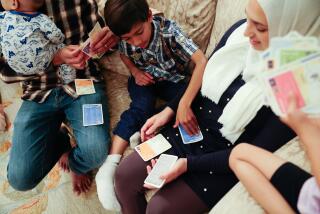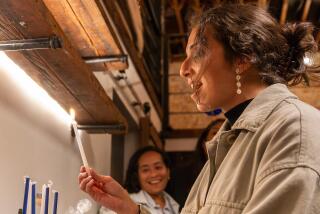Pandemic meets pastoral mission: A transplanted L.A. couple’s Jerusalem sojourn
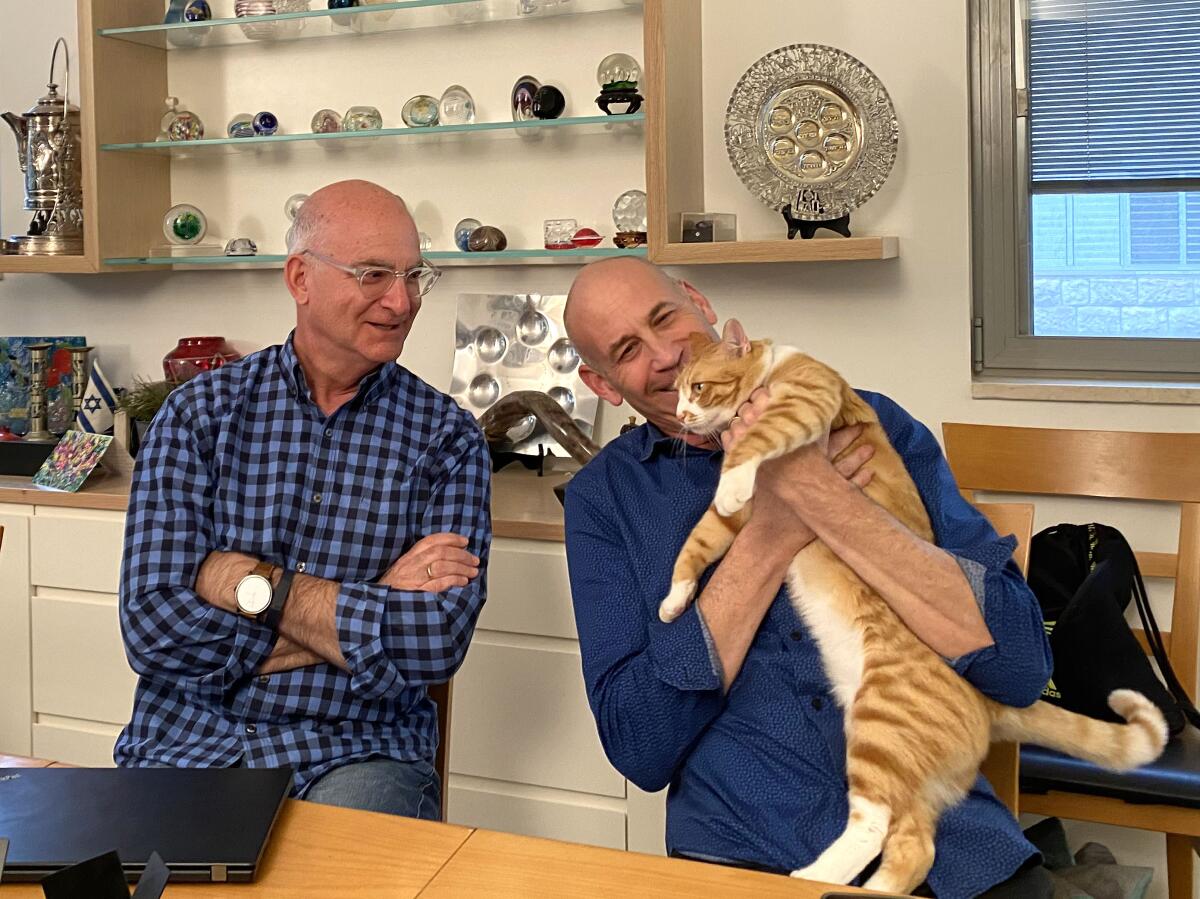
- Share via
JERUSALEM — The word for a biblical pestilence — magefa — has survived down through the centuries, making its way into the slangy, buzzy Hebrew of modern-day Israel.
As a worldwide epidemic rages, there is scarcely a day when Evan Kent — a Los Angeles cantor who moved to Jerusalem seven years ago with his rabbi husband — does not hear it uttered amid the old stones. Kent, 60, first learned magefa long ago, in his liturgical studies.
For decades, he was a mainstay of the Westside’s Temple Isaiah, as well known for charisma and compassion as for the hauntingly melodious tones he brought to his role as cantor.
Now he and his husband, Rabbi Donald Goor, find themselves at the confluence of extraordinary events that would not be out of place in a scriptural parable. As do millions of others around the globe, Kent and Goor, 61, now face daily strictures meant to curb the spread of the novel coronavirus infection.
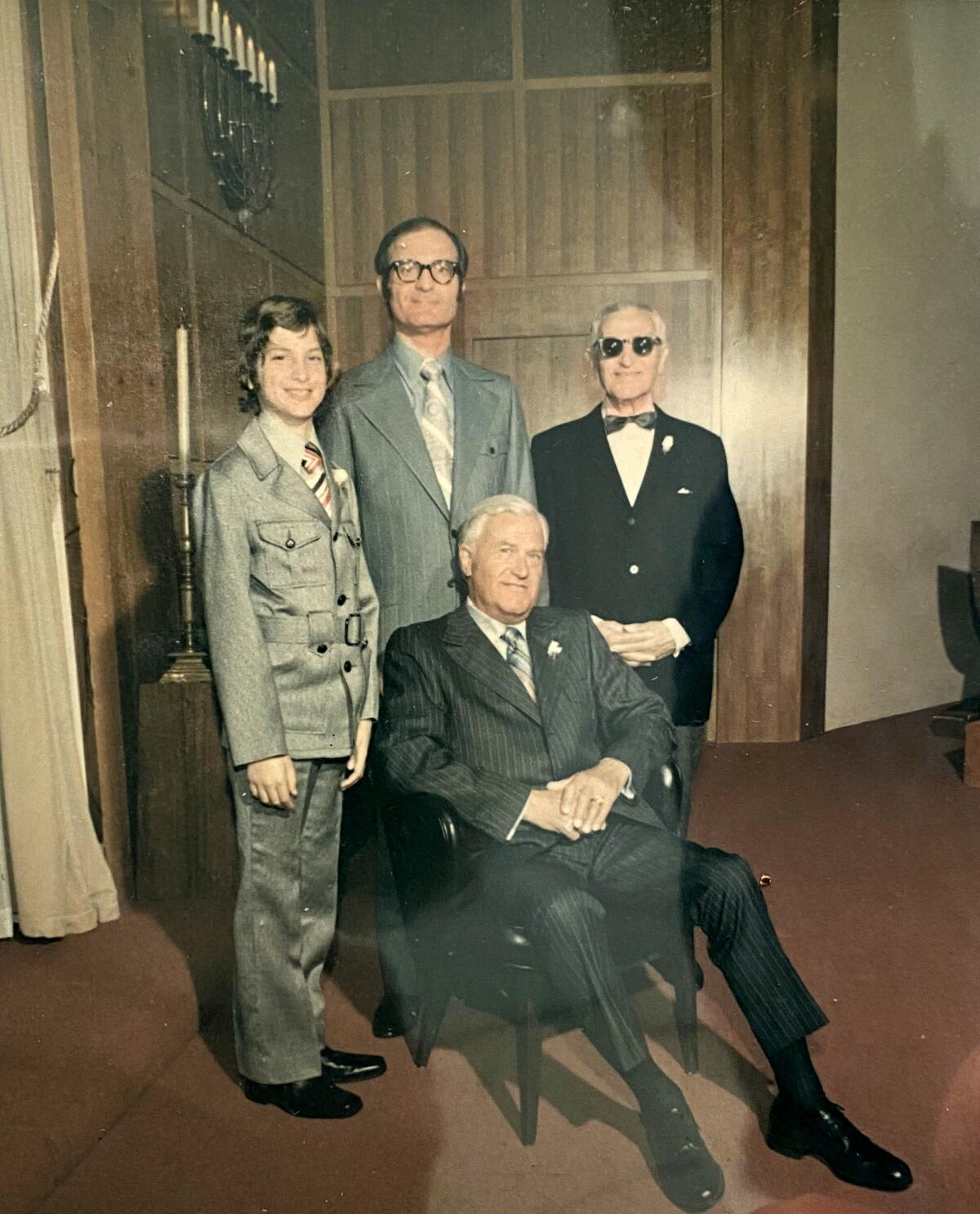
They shelter indoors, forbidden to walk familiar Jerusalem streets named for Old Testament figures and cultural giants. Their vibrant pastoral life is curtailed; they are separated from elderly parents.
But in a particularly painful twist, the pair is also cut off from the congregation they serve as nonresident clergy in the heart of coronavirus-devastated northern Italy. They normally fly to Milan for the holiest events of the Jewish calendar. But Passover is less than two weeks away, and a visit is impossible.
Still they are kept abreast of the despair. One Milanese congregant wrote to Kent, describing an overloaded, collapsing health system, with Italian doctors making once-unthinkable decisions about who among patients with catastrophic respiratory failure is given access to life-saving ventilators.
“It’s like prophecy,” said Kent. “And just like the ancient prophets, the warnings aren’t heeded. I think we all feel embattled. We’re all unprepared. And we all feel directionless.”
Accustomed to accompanying their Milan flock through joys and sorrows large and small, the cantor and the rabbi are left at a wrenching distance.
Since 2012, when their association with Milan’s Temple Beth Shalom began, Kent and Goor would preside over commemorations of holidays including Rosh Hashana, the Jewish New Year, and Yom Kippur, the Day of Atonement.
But by early March, the virus outbreak prevented them from traveling to Italy for Purim, the joyous festival marking the Jews’ salvation from a threatened massacre in ancient Persia. And now Passover, the springtime rite of rebirth that marks the Israelites’ flight from slavery in Egypt, is almost upon them.
But there are miles these days that cannot be crossed. The couple’s own journey to the Holy Land was a long one. They settled in Goor’s native Southern California in 1987, a year after they met as seminary students in New York’s Hebrew Union College.
Both found long-lasting pastoral homes in Los Angeles, Kent as cantor at Temple Isaiah, and Goor, the son of San Diego Rabbi Joel Goor, as senior rabbi of Temple Judea, in Tarzana.
In some ways, though, Jerusalem had always called to them. In 1972, during a tumultuous era of wars between Israel and its Arab neighbors, Kent’s family came to the city for his bar mitzvah.
“My parents were crazy,” he said wryly.
Despite the distance from their former California lives, Goor and Kent have remained immersed in the world of Reform Judaism, in which both are prominent. Kent represented the American Conference of Cantors during the creation of the Reform movement’s new machzor, the Jewish prayer book used on the High Holy Days.
Goor is the editor of the guidebook for rabbinic pastoral work for the Central Conference of American Rabbis and chairs the group’s publications. He also serves as the rabbinic liaison for Daat, an international travel-planning company specializing in religious and educational tours.
“All I do now is cancel events,” he said ruefully, referring both to his role as a rabbi in high demand for now-curtailed bar mitzvahs and weddings and to his job as a travel consultant for other rabbis.
Before the two moved to Jerusalem in 2013, they envisioned all manner of challenges.
“We thought about Jewish orthodoxy here,” said Goor, referring to conservative sects in Israel whose influence is magnified by powerful political parties. “We thought language acquisition would be an issue. Also homophobia, being far from our families, cultural displacement — maybe war.”
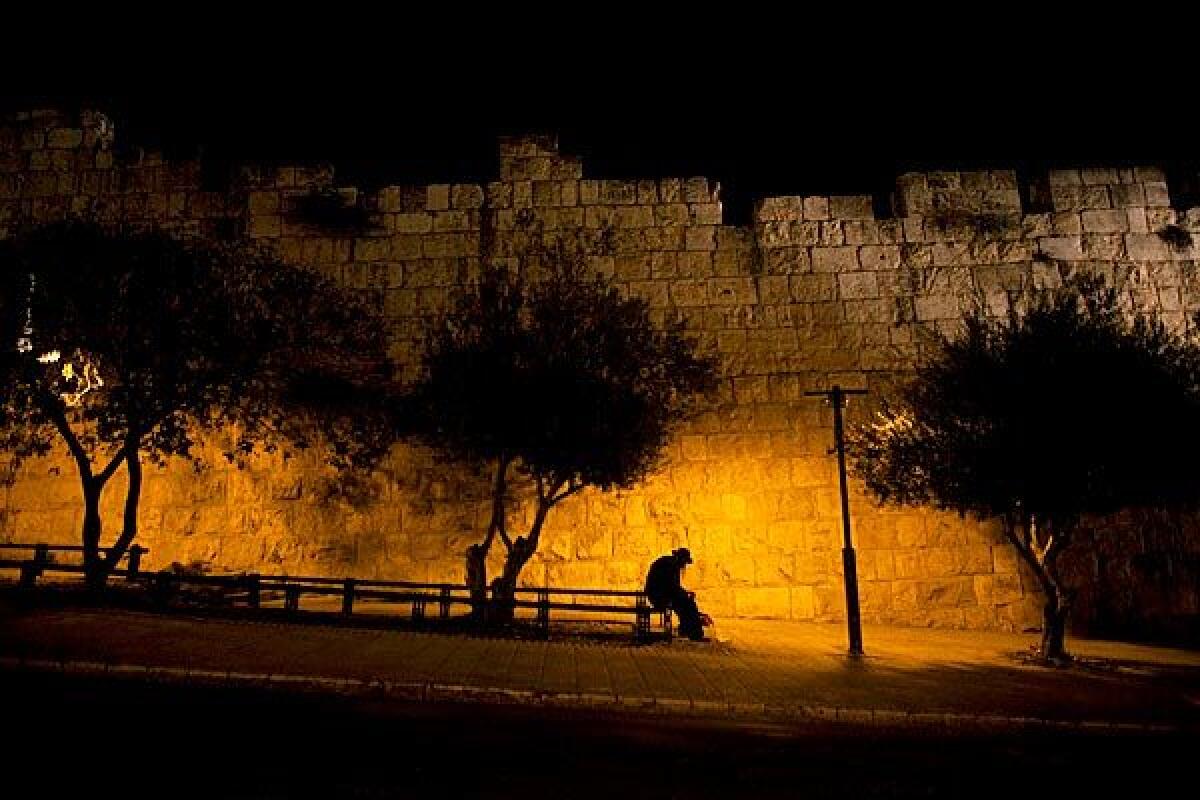
Although plagues are a poignant recurring theme in Jewish history and teachings, they never really contemplated experiencing one personally, as they are now.
Friends always ask if the two feel safe in Jerusalem, which over the years has experienced spasms of violence, including bus bombings and suicide attacks.
Kent, while describing himself as “generally not in line with the Israeli government in terms of policy,” pointed to Prime Minister Benjamin Netanyahu’s response to the outbreak: swift imposition of travel restrictions, quarantines and stringent rules on public gatherings. Such measures probably saved lives, he said.
Goor, for his part, cited the country’s advanced medical facilities and universal healthcare.
“In America, you’ve got private healthcare, and from what we’re seeing, a lack of coordination at all levels of the local, state and federal response,” he said. “Here, we get a sense that it is all coordinated.”
Before the beginning of mandatory isolation amid the country’s lockdown, the couple hosted frequent Sabbath dinners, featuring Kent’s homemade challah — eggy braided bread — with service on bone china given to them by Goor’s grandmother.
Their light-filled Jerusalem living room is adorned with family mementos and religious artifacts — a photo of four generations of Goor’s family at his 1971 bar mitzvah in San Diego, nestled among Hanukkah menorahs and kiddush cups, the elaborate goblets used for sanctifying Sabbath wine.
Far from seeing themselves as strangers in a strange land, they have embraced what Kent, with a smile, calls “this adventure we’re living.” If anything, the larger themes of displacement and redemption are central to their faith.
Kent, who holds a doctorate in music education from Boston University, spent much of the last year crisscrossing the United States performing his one-man show entitled “Shards,” which he calls a comedic drama exploring the search for home and homeland.
Their life together also personifies the marriage of tradition and technology. Kent teaches the singing of ancient liturgical music, shifting much of his work online via Zoom. He posts daily candid videos describing life in Jerusalem during the coronavirus, connecting with friends and congregants on Facebook.
Kent and Goor exchange daily messages with the synagogue leadership in Milan. Together, they are preparing for Passover, weighing how it can be celebrated and observed in these dark days of pandemic and death.
“With war, you know what you’re dealing with, because you know there will be an end point,” Goor said. “Now, we don’t know what we’re dealing with, and we don’t know what the end point may be.”
Tarnopolsky is a special correspondent.
More to Read
Sign up for Essential California
The most important California stories and recommendations in your inbox every morning.
You may occasionally receive promotional content from the Los Angeles Times.

